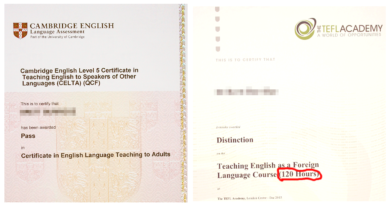So Who Exactly Studies for the CELTA TEFL Certificate?
I did my CELTA in 2015. On my course were 18 attendees (including myself). For our teaching practice we were divided into 3 groups of 6.
So who exactly signs up for a CELTA and puts themselves through the gruelling training regime?
One thing that was different on my particular CELTA course was that I chose the part-time route. Me and my fellow students did the CELTA over the course of about 3 months.
Did it make it any easier? I don’t think so. But that’s a topic I’ll explore in another post.
The good thing about doing the part-time course was that I got to meet 3 different cohorts of students who had signed up to do the usual CELTA-in-a-month course.
I did notice that on the month long course the attendees tended to have an average younger age than the attendees on the part-time course. The part-time course was particularly well suited to:
- Those who were already established teachers who wanted to get an official qualification for something they were already doing.
- People like me who had already had successful careers doing something else and had the money to take 3 months off work to focus exclusively on passing the CELTA.
Teaching English While Drifting Around The World
There’s no getting away from the fact that the CELTA attracts a lot of, for want of a better word, drifters. You know the kind of people who go overseas and end up working in bars. I won’t call them out for not being able to hack it back home. Because the end of the day they were enjoying the sun and sea in Barcelona while their friends back home were working the 9-5 in dull industrial estate office buildings.
Mid-Life Career Changers
I found that people making mid-life career changes were actually quite rare on the CELTA. Of the intake of 18 students I found myself in, only one other student had a professional career a bit like myself. Before I did the CELTA I’d spent 17 years working as a software developer.
I found it strange that there were so few mid-life career changers. However I guess many people have family commitments or have pets they can’t leave or have houses and worldly goods they don’t want to get rid of.
It’s a shame really because more mature teachers with real world experience are in great demand as English teachers. Not least because real world experience is invaluable when it comes to teaching English for Specific Purposes. For example, I’m now teaching English to students who are majoring in Accountancy and in IT. I have a great rapport with the IT students, not least because I can feel their pain when it comes to learning programming languages.
I also have a background in finance (having worked in the City of London for a time) so I’ve used that knowledge to plan a few finance related lessons for my Accountancy students.
Recent Graduates Seeking a Better Life
I would say that the majority of CELTA course attendees at my school were young native English speakers who had just graduated from University. They had mountainous student loan debts and saw the CELTA as a way to make a steady income while also doing that thing young people do – backpack around the World.
Having said that I have to say that the majority of the young recent graduates on the CELTA courses had fallen in love with Barcelona and wanted a way of living there while making money.
Of all the CELTA course attendees I spoke to other the months, it seemed that I was the only one who actually wanted to go to the other side of the World and teach.
Non-Native English Speakers
I did my CELTA in Spain and I was impressed by how many non-English native speakers there were on my course. I remember there being 3 or 4 Spaniards, a Portuguese, a German and even a Russian.
So why were they studying for the CELTA?
In every country there is plenty of demand for teachers who are native speakers and who can also teach English to a high standard.
For example I am now teaching in China. Most of the English classes are taken by teachers who are Chinese nationals. We foreigners are here as a kind of bonus, to supplement their core English classes with real world practice with actual native speakers.
There is also demand for teachers who can teach more than one foreign language. For example in China most Universities have English language programmes. But many also teach German and Japanese. Larger Universities or specialist language schools may also teach Korean, Italian, Spanish and Russian.
Finally European nationals at least can find well paid jobs in my home nation the UK if they speak a foreign language and can demonstrate a good knowledge of English.
I should also say that 2-3 of the student guinea pigs I taught English to on my CELTA course were actually English teachers themselves! So they were studying at Upper-Intermediate level while simultaneously teaching Beginners. I guess I could do the same with Mandarin Chinese. I definitely know enough to teach the very basics of that language.
The CELTA Trainee Gender UnDivide
So what was the gender ratio on my CELTA course?
I’d say it was 60% female, 40% male. I was pleased to see so many men entering the teaching profession. Back in the UK mainstream teaching is generally much more popular with women.
The ratio is also pretty good considering that women are generally thought to be far superior at learning language (and hence teaching it). At my Chinese University the English and Business English major classes are usually around 85% girls and 15% boys. In fact I made a guest appearance at a translation class in which there were 30+ girls in the class and only a since boy. Lucky guy!!!
The Class Divide – Is the CELTA Elitist?
OK so I have to add that the majority of the attendees on the CELTA were from the middle classes of society. That’s definitely NOT what I found when I did my 120 Hour TEFL Certificate with The Tefl Academy in Central London back in 2014.
On my Tefl Academy two day training course I was studying with people from around 20 different countries and all walks of life. A lot of trainees were recent immigrants to the country who wanted to help other people from their communities improve their English. And there were also a fair few nursery school assistants who wanted to begin the process of moving up the teaching food chain so to speak.
I guess that the cost of the CELTA puts a lot of people off, especially when you can do the 120 Hour Certificate (with 20 hour weekend course) for around 20% of the cost of the CELTA.
I’ll revisit this theme in a future post.
So that’s an overview of who might be on a CELTA course with you. Do you fit the profile of recent graduate, mid-life career changer or non-Native speaker? Leave your comments below.




Education is very necessary for all humans